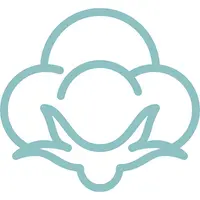Conventional vs organic cotton
The trend towards eco-friendly and sustainable fashion continues to grow, which is great news. Cotton plays an important role in this development. Every year, more than half of the produced clothing is made from cotton. But what is the difference between conventional and organic cotton?


CONVENTIONAL COTTON: approximately 99% of the world's cotton production. Conventional cotton is a huge burden on the planet and on people. The vast majority of cotton is grown using synthetic pesticides, herbicides and fertilisers to maximise yields. These chemicals leach into the soil and water, pollute the environment and threaten the lives of local communities. Genetically modified (GM) seeds are commonly used, with many farmers becoming dependent on expensive seeds and corresponding pesticides from large agrochemical companies. This dependence often traps them in a cycle of debt and economic instability.

ORGANIC COTTON: about 1% of the world's cotton production. Organic cotton is grown from seeds that have not been genetically modified and without the use of chemical pesticides, herbicides or fertilizers. Instead, farmers use holistic farming practices such as crop rotation, intercropping and natural fertilizers to control pests. Such cultivation supports biodiversity. Water used in organic farming can be safely returned to the soil and other water sources without risk of pollution. Farmers can reuse cotton seeds from their own organic harvest, helping them to become more self-sufficient and prosperous.

A third type is also emerging on the market, the so-called "COTTON IN CONVERSION": Farmers who are converting from conventional to organic cotton farming can sell their cotton as cotton "in transition" while they await certification. Chemical pesticides, herbicides and fertilisers can no longer be used from the first day of transition. However, it takes about three years for the soil to recover from the use of chemicals, so certification takes several years. During this period, cotton in the conversion process may still contain traces of chemical pesticides or fertilisers, so it cannot be considered organic.
At MERCHYOU, we are committed to promoting sustainable development and environmental responsibility in all aspects of our business. We are pleased to partner with Stanley Stella, our main supplier, who is committed to using only 100% organic cotton in their products. This initiative not only ensures that our products are made from the highest quality material, but also minimises the environmental impact that conventional cotton farming can produce. Working with this partner allows us to offer our customers not only stylish and quality products, but also the opportunity to support sustainable development in the textile industry.
![]()

